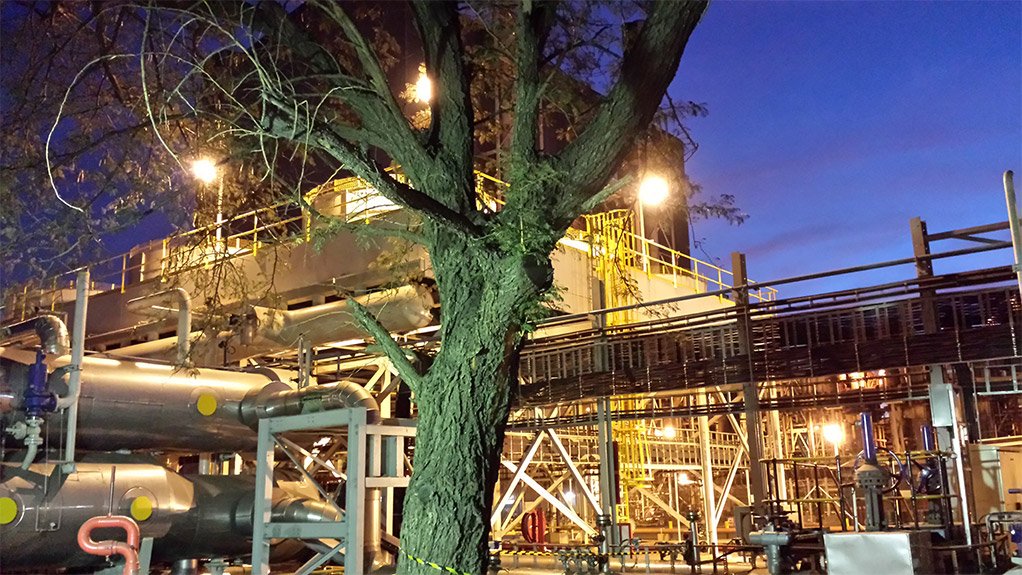Platinum miner Anglo American Platinum (Amplats) could increase the capacity of clean power production at its Waterval smelting complex, in Rustenburg, in the North West, which might result in an investment similar to the new R150-million Eternity Power Thermal Harvesting plant used to generate cleaner and inexpensive power for the smelting complex.
This is according to clean energy projects originator and developer Vuselela Energy director Jacques Malan, whose company built, partially owns and operates the Eternity Power Thermal Harvesting plant.
Amplats is supplementing its energy demands through the Eternity Power Thermal Harvesting plant, which started operations in June. Vuselela is in discussions with Amplats to possibly develop an additional power plant for Waterval in the near future, says Malan.
He expects these discussions to gain momentum in February, when the power plant goes through its planned shutdown after eight months of operation.
“At this time, Amplats will have an opportunity to evaluate the performance of the plant, which will enable the miner to make an informed decision about the plant and its continued working relationship with Vuselela.”
Malan tells Mining Weekly that the existing plant has been exceeding its availability and efficiency targets since it started commercial operation. He added that the plant was designed for an operational peak of 4.29 MW, and achieved 4.92 MW within the first month of operation.
The power plant uses waste heat from Amplats’ converter plant’s cooling circuit to evaporate an organic liquid and drive an expansion turbine.
The power plant has an installed capacity of 5 MW, of which roughly 4.3 MW is available to the grid – reducing Amplats electricity consumption, which it buys from State-owned power provider Eskom.
The amount of power generated by the plant also results in reducing the smelter’s carbon footprint and increasing efficient energy use.
“The plant is innovative in that it has been designed to capture relatively low-quality thermal heat from the smelter and convert it into electricity. This innovation provides a solution for the energy challenges of an energy-intensive process, such as a smelting,” says Malan.
He tells Mining Weekly that the Eternity Power Thermal Harvesting plant is the first Organic Rankine Cycle (ORC) power plant in South Africa. In such a plant, the cycle is adapted to low and moderate temperature heat sources, such as waste heat from industrial plants.
ORC technology is mostly applicable to geothermal power plants and the recovery of waste heat from small to medium-sized gas turbines, such as compressor stations.
ORC is also applicable to heat recovery of industrial processes, such as at cement plants, and can offer advantages, compared with conventional steam bottoming cycles.
“The set of technologies used at the Eternity Power Thermal Harvesting plant had not previously been used in a smelter environment and a significant amount of novel work was done to design the integration of the technology into the smelter complex and establish the technical feasibility of the process,” says Malan.
He adds that a suite of patents were developed specifically to capture and harness waste thermal energies from metallurgical and chemical processes for the purpose of power generation and are likely also patentable worldwide.
“The result is that the power plant is the first of its kind in the world in terms of being connected to a convertor at a metallurgical smelter.”
Malan says the innovative qualities of the Eternity Power Thermal Harvesting plant resulted in its winning an innovation award last month at the My World of Tomorrow event, held at the Sandton Convention Centre, in Johannesburg.
In addition, he says Vuselela also won the Small, Medium and Micro-Sized Enterprises (SMME) Company of the Year Award, with Malan winning an award for innovator of the year.
My World of Tomorrow is a three-day technology and lifestyle event encompassing sectors, such as SMMEs, corporates, rural communities and the public sector.
The event is a convergence of African minds, showcasing future products and services by leading brands. It creates a stage where technology and business intersect, norms are challenged and solutions to current problems are discussed. It is a movement that aims to improve the lifestyles of those living in Africa.
Timelines
Malan says Vuselela started working with Amplats in 2010, after the miner wanted to acquire a solution that would help it become energy efficient.
After various feasibility study processes, financial close occurred in November 2012. Vuselela originally envisaged that the construction and installation of the plant would take about 18 months to complete, with the plant scheduled to start operating commercially in June 2014.
However, unforeseen events – including labour strikes, an inexperienced installation contractor, difficult geological conditions and heavy rain, which forced construction to be suspended on several occasions – caused a delay in the construction process, which led to commissioning only being undertaken in May.
Vuselela dealt with some of the challenges by, for example, hiring a new cabling contractor to work on the project. “Within six weeks, the new contractor had sorted out everything that related to cabling challenges – from the cable racking to the electric cabling,” says Malan.
He tells Mining Weekly that Vuselela learnt important lessons from this experience of dealing with the unplanned delays, and will use this experience to ensure that new power projects are “significantly” easier to implement.
He adds that Vuselela is glad to have a patient and understanding client in Amplats, noting that the miner’s patience has been rewarded, as it now has a successful power plant that supplements its energy needs.
Edited by: Tracy Hancock
Creamer Media Contributing Editor
EMAIL THIS ARTICLE SAVE THIS ARTICLE
To subscribe email subscriptions@creamermedia.co.za or click here
To advertise email advertising@creamermedia.co.za or click here













